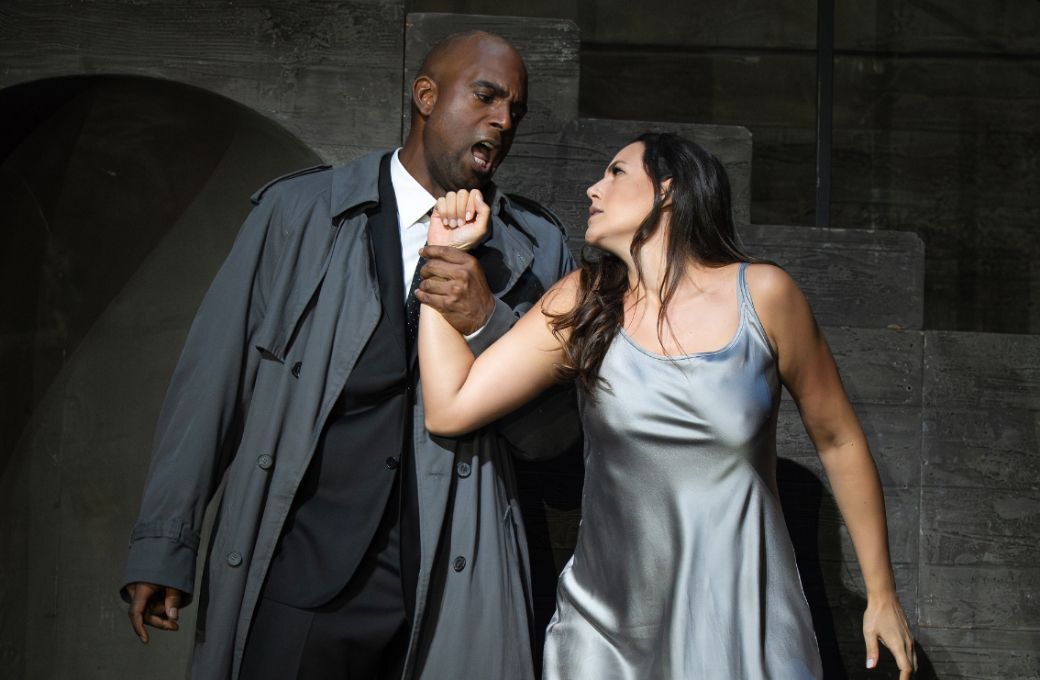Opera lovers’ favorite roué is back at the Met after only a single season’s absence. Ivo van Hove’s pessimistic production was met with mixed feelings two years ago: not emotionally shaded enough, unappealing on the eye (blame designer Jan Versweyveld), somewhat abstract – where is the graveyard? – and utterly joyless, all of which brings us right away to the “giocoso” part of the subtitle. I’ve never thought the funny moments particularly funny: a work that begins with an attempted rape and a murder will have a great deal of trouble evoking laughter when an innocent character is pummelled into almost unconsciousness, characters in tacky disguises get away with it, a would-be bride is almost seduced in front of her nerdy fiancé, the dead return from the grave, a female stalker can’t control herself, and our “hero” gets continual joy out of wreaking havoc. Not to mention the whole “dragged down to hell” business.
Concrete Brutalist buildings, all gray and black (like An D’Huys’ costumes) hover over proceedings, with staircases and alleyways used for escapes – but to where? They shift subtly enough to keep everyone puzzled. Grim and puzzling. Far from distancing the audience, it brings the characters close to us. They are the ruling class, which allows them to behave as they wish, and they seem powerless in the face of the Don, clearly a man of power. Only hell can cleanse his evil and restore order.

When the production was new, the towering Peter Mattei sang the Don, just about perfect. Stepping into his shoes is Met favorite Ryan Speedo Green. Well crafted, smoothly acted, charismatic and handsomely sung, the role suits him well. More physically brutal than his predecessor, it took little for him to toss Donna Anna to the ground and even less to do the same with Zerlina. Violence was always right around the corner from charm and seduction. Even the Champagne Aria, dispatched in a rip-snorting 60 seconds, was nasty and menacing. “Deh vieni alla finestra” may have lacked Mattei’s almost hypnotic legato, but it was stunning and sexy nonetheless, at one with Van Hove’s concept.
Just as impressive was Ben Bliss as Don Otttavio.In a role that can often seem like a bore and a wimp, Bliss was more aggressive than usual. He could flare up with anger and, moments later, caress Don Anna almost lustily, not like the usual puppy he's portrayed as. His handsome tenor has more body to it than we normally hear, but that did not stop him from singing softly in his first aria and attacking "Il mio tesoro" with ferocity and almost supernatural breath control. Similarly, Adam Plachetka took the role of Leporello and ran with it. The only vaguely amusing character in the opera, Plachetka’s anger and disgust with the Don shone through. And his colorful bass voice wheedled poor Anna with more than a hint of sarcasm. There was no way he and the Don, in disguise, could have passed for one another, but that just made it more entertaining.
Adam Palka was a full-voiced Commendatore and William Guanbo Su a more-than-usually strong Masetto, capable of taking a punch and singing with impressive tone.
The three women in Giovanni’s purview were splendid. Federica Lombardi, a nightgown-clad Donna Anna, was hardly lacking in sensuality or force – she latches on to and tries to strangle the Don in the opening scene. Her tone was rock solid, making “Or sai chi l’onore” the biting declaration it should be. She also tackled “Non mi dir” with ease, all coloratura in place. Janai Brugger was sympathetically unhinged as Donna Elvira without sacrificing the character’s dignity, but whoever dressed her in a frumpy gray business suit should be spoken to. Hera Hyesang Park’s smallish but gorgeous soprano did great service to Zerlina's music with a beautifully sensitive “Vedrai carino”.
Yannick Nezet-Seguin conducted with uncharacteristic verve, very much as if he were enjoying himself. The first half hour or so of Act 2 always has trouble getting started, but he breezed through the entr’acte-like scenes, and hit hard when the darkness resumed.
The supper scene was all jollity and snide asides, with Leporello stuffing his mouth with food and a lot of running back and forth until it literally went to hell. Walls disappeared and a three dimensional backdrop of the underworld took over. It was actually unsettling. Appalling and arrogant, the scene was both scary and cathartic. And then, as the Don is dragged to hell. everything changes. The walls return, but this time they are wooden and sun drenched with colorful flowers in pots. We are clearly being told that when evil is vanquished, everything else blooms and thrives. And the foreboding D minor of the overture has been cleansed and replaced with D major. Van Hove has taken us for quite a ride.


